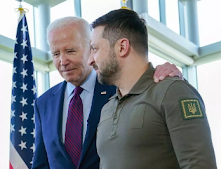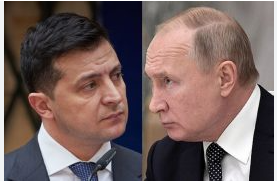Russia-Ukraine War: Escalation, Western Involvement, and Global Implications
The Russia-Ukraine war, now into its third year, is reshaping global politics and alliances. Recent developments, such as Ukraine deploying Western-supplied missiles against Russian targets and the reopening of the U.S. Embassy in Kyiv, underscore the war's escalating nature and its global significance.
U.S. Embassy Resumes (Reopens)in Kyiv Amid Tensions
The U.S. Embassy in Kyiv has resumed operations after a temporary shutdown due to the threat of Russian air attacks. Ambassador Bridget A. Brink urged U.S. citizens in Ukraine to stay vigilant and heed air alerts. The embassy had closed after Ukraine intensified the conflict with missile strikes deep into Russian territory.
This reopening signals strong U.S. support for Ukraine, even amidst rising risks to diplomats. It highlights the U.S.'s strategic commitment to maintaining ties with Kyiv despite ongoing threats.
Ukraine Strikes Deep into Russian Territory
Ukraine has employed Storm Shadow cruise missiles (UK-made) and Army Tactical Missile Systems (ATACMS) (U.S.-made) to attack Russian military facilities. These strikes, previously restricted to defensive use within Ukraine, are a watershed moment in the conflict.
Key targets included Russian command centres in Bryansk. The aftermath, including missile debris, has been widely shared online.
In response, President Vladimir Putin approved changes to Russia's nuclear doctrine, allowing for a nuclear response to major threats. This shift has escalated concerns about the potential for a nuclear conflict.
Why the U.S. Supports Ukraine Despite Risks
The U.S. backs Ukraine for several reasons:
- Prevent Russian Expansion: Russia’s aggression threatens global stability, and aiding Ukraine serves as a deterrent.
- NATO Commitment: Supporting Ukraine reinforces U.S. allegiance to NATO allies.
- Democracy: The U.S. frames its support as a defence of democratic values against authoritarianism.
However, critics argue that allowing Ukraine to strike within Russian borders risks turning the war into a full-blown nuclear confrontation.
Ukraine's Stance and Russia's Reactions
President Volodymyr Zelenskyy has urged Western nations to lift restrictions on advanced weapons, arguing that limitations only embolden Moscow to target civilians and infrastructure.
In response, Russia has deployed advanced defence systems like the S-400 and Pantsir missile systems. While some Ukrainian missiles have been intercepted, others have caused significant damage, including fires at military installations.
Foreign Minister Sergey Lavrov described these strikes as a “new phase of Western war against Moscow” and warned of severe retaliation, raising fears of further escalation.
Role of the UK and NATO Allies
The UK has authorised the use of Storm Shadow missiles against Russia, marking a major policy shift. British Defence Secretary John Healey cited Ukraine’s recent battlefield successes as justification for this support.
However, some NATO members, including Greece, Hungary, and Italy, have withdrawn their embassies from Kyiv, citing safety concerns. This divergence underscores the challenges of maintaining alliance unity.
North Korea's Controversial Role
Reports claim that over 10,000 North Korean soldiers have been deployed near Ukraine’s borders, further complicating the geopolitical landscape. Western officials have cautioned against Moscow’s reliance on such unusual alliances, warning of potential risks.
Global Concerns and Turkey’s Perspective
Turkey’s President Recep Tayyip Erdoğan criticised the U.S. for enabling Ukraine’s use of long-range missiles, warning that the conflict could escalate into a global crisis. This rhetoric reflects growing international unease over the war’s trajectory.
Ripple Effects of U.S. Leadership Changes
As President Joe Biden’s term nears its end, uncertainty looms over the U.S.'s future approach. President-elect Donald Trump has promised to prioritise ending the war but has offered little detail on his plans.
Trump’s scepticism about U.S. military aid to Ukraine contrasts sharply with Biden’s policies, raising questions about the sustainability of American support for Kyiv.
Zelensky has emphasised the critical importance of continued U.S. aid, warning that its loss would severely weaken Ukraine’s military and diplomatic standing.
Civilian Impact and Global Ripple Effects
The Russia-Ukraine war is Europe’s largest conflict since World War II, with devastating consequences for civilians. Russian airstrikes have destroyed urban areas, displaced families, and left critical infrastructure in ruins.
Globally, the war has exacerbated energy and food crises, particularly in developing countries. Efforts to broker a ceasefire have stalled as both sides seek stronger negotiating positions.
Future Prospects
The war’s future depends on several factors:
- Western Support: Continued military aid will shape Ukraine’s resistance.
- Diplomatic Efforts: New U.S. leadership could alter peace negotiations.
- Russia’s Strategy: Moscow’s response to escalating tensions, particularly its nuclear stance, will be pivotal.
As the conflict reaches its 1,000th day, the world watches with a mix of hope and fear, uncertain of what lies ahead. Ukraine’s resilience and its allies’ determination remain central to this evolving crisis
For more updates on the Russia-Ukraine conflict, stay tuned to FreshTrendReport.

















